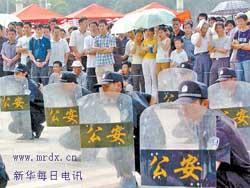
A police force holds drills to cope with possible mass incidents and emergencies. (Source: Xinhua)
Based on surveys of resident attitude, a social monitoring research team with the CAS Institute of Psychology has established a predicting model on the possibility of mass incidents -- collective conflicts against the administration.
The model could tell possible mass incidents in a city or county with "50 to 90 percent accuracy" and has received attention from senior Chinese officials, according to Prof. WANG Erping, head of the research team.
The present model is set up via stepwise regression and discrimination analyses, says Prof. Wang. It takes the amount of mass incidents of the surveyed city/country between 2004 and 2007 as dependent variables. The variables of the model involve the social attitudes of both urban and rural residents obtained from surveys in the same phase, including their satisfaction with public policies and the executives of both central and local administrations, in such aspects as the reforms of the educational system, medical service and social security; employment; family planning; environment protection; anti-corruption endeavors; the local officials' performance and so on.
The predictors also involve residents' judgments over major social issues like corruption, rich-poor gap, public security, social fairness as well as their behavior intention toward these social problems. Statistical data including the amount of received complaint letters and visits, the rate of complaints to higher authorities and total cases of dereliction of duty and misprision are also added into the model.
The study has indirectly proved the fact, Prof. Wang explains, that policy failures and misadministration are root causes of mass incidents, which reflect the accumulated grievance among people over time. He also notes that the model may predict such incidents much more accurately for the very and next years than for further years.
The research is just a primary argument for the feasibility of social monitoring based on resident attitude survey, Wang says. The researchers will work on to improve this model, and extend its functions to monitoring economic outlook and ethnic and religious conflicts.





